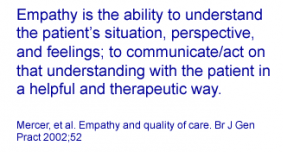December 1st, 2011 by John Mandrola, M.D. in Health Tips, Research
1 Comment »

There was important news this month on statin drugs. As one of the world’s most effective and commonly used medications, statins provide great writing topics. Lots of people have high cholesterol–including cyclists. Lots of people are interested in avoiding our mostly deadly disease.
I’d like to tell you about a recently-published (Lancet) landmark study that should quell safety concerns over statin drugs.

The punch line after I tell you the study’s results are short and sweet. Scroll down if you wish. But first, statin drugs are misunderstood enough to warrant a little blog-like simplicity. Let’s start with some background.
A brief statin review:
Statin drugs are best known for their cholesterol-lowering properties. The notion is simple: Read more »
*This blog post was originally published at Dr John M*
October 8th, 2011 by John Mandrola, M.D. in Health Tips, Opinion
No Comments »

I recently wrote about the incredible sensations that come with vigorous exercise. Perhaps it was the post ride cannabinoid flurry, but it’s possible that I went too far in suggesting that ‘we’ (doctors, patients, the whole of Western Society) default first to pills before healthy living.
Two commentors called me out on this snark. They wrote about valid points.
One comment focused on the fact that her AF medicines were causing side effects that made vigorous exercise difficult. The second objected to my inference that exercise alone could substitute for the many benefits of modern medicine.
To the idea that medicine Read more »
*This blog post was originally published at Dr John M*
July 28th, 2011 by John Mandrola, M.D. in Opinion
No Comments »

Today I would like to say thanks to a group of colleagues that too often go un-thanked.
These would be my hospital-based internal medicine friends: hospitalists are what they are called.
This idea came to me after reading Dr Robert Centor’s post on KevinMD. In his usual concise manner, he laments the lack of respect that many sub-specialists show hospitalists.
I feel differently about my hard-working colleagues.
As a sub, sub-specialist who works primarily in the hospital, I would like to say how grateful I am to have knowledgeable, hospital-based internists available.
I believe, and write frequently about the importance of seeing the forest through the trees. A good doctor must see the big picture: a little atrial fib, for instance, isn’t a major problem if you can’t move, eat or have widespread Cancer.
But for good patient care, the details are important too. Hospitalists are good at details. In fact, Read more »
*This blog post was originally published at Dr John M*
March 16th, 2011 by StevenWilkinsMPH in Opinion, Research
3 Comments »

 Is anyone else tired of hearing about how important empathy is in the doctor-patient relationship? Every other day it seems a new study is talking about the therapeutic value of empathy. Enough already!
Is anyone else tired of hearing about how important empathy is in the doctor-patient relationship? Every other day it seems a new study is talking about the therapeutic value of empathy. Enough already!
It’s not that I don’t believe that empathy is important — I do. I also believe the data that links physician empathy with improved patient outcomes, increased satisfaction, and better patient experiences.
A recent study released in Academic Medicine reported that “patients of physicians with high empathy scores were significantly more likely to have good control over their blood sugar as well as cholesterol, while the inverse was true for patients of physicians with low scores.”
Findings from this study by Hojat, et al. are consistent with a 2009 study by Rakel, et al. which found that among patients with the common cold, those with physicians displaying high empathy had a significantly shorter duration of illness and trend toward lesser severity of illness and higher levels of immune response compared to those patients whose physician displayed less empathy. Read more »
*This blog post was originally published at Mind The Gap*
March 16th, 2011 by RyanDuBosar in Better Health Network, Research
No Comments »

Obesity contributes to cardiovascular risk no matter where a person carries the weight, concluded researchers after looking at outcomes for nearly a quarter-million people worldwide.
Body mass index, (BMI) waist circumference, and waist-to-hip ratio do not predict cardiovascular disease risk any better when physicians recorded systolic blood pressure, history of diabetes and cholesterol levels, researchers reported in The Lancet.
The research group used individual records from 58 prospective studies with at least one year of follow up. In each study, participants were not selected on the basis of having previous vascular disease. Each study provided baseline for weight, height, and waist and hip circumference. Cause-specific mortality or vascular morbidity were recorded according to well defined criteria.
Individual records included 221,934 people in 17 countries. In people with BMI of 20 kg/m2 or higher, hazard ratios for cardiovascular disease were 1.23 (95 percent CI, 1.17 to 1.29) with BMI, 1.27 (95 percent CI, 1.20 to 1.33) with waist circumference, and 1.25 (95 percent CI, 1.19 to 1.31) with waist-to-hip ratio, after adjustment for age, sex, and smoking status. After adjusting for baseline systolic blood pressure, history of diabetes, and total and HDL cholesterol, corresponding hazard rations were 1.07 (95 percent CI, 1.03 to 1.11) with BMI, 1.10 (95 percent CI, 1.05 to 1.14) with waist circumference, and 1.12 (95 percent CI, 1.08 to 1.15) with waist-to-hip ratio.
BMI, waist circumference, or waist-to-hip ratio did not importantly improve risk discrimination or predicted 10-year risk, and the findings remained the same when adiposity — the carrying of adipose tissue (fat) — measures were considered. Read more »
*This blog post was originally published at ACP Internist*















